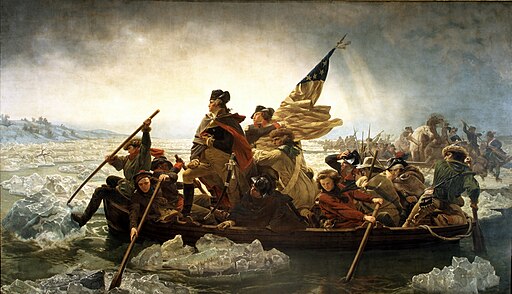James Monroe (1758-1731), who served as the fifth U.S. president from 1817 to 1825, is often identified as the last of the Founding Fathers. Born in Virginia, where he would serve as governor and which he would represent in the U.S. Senate, Monroe attended the College of William and Mary before serving as a soldier in the Revolutionary War. (He is depicted in the famous painting by Emanuel Leutze of 1851 of Washington crossing the Delaware River. Monroe is carrying the flag.)
Monroe studied law under Thomas Jefferson, near to whose residence he would eventually build a house known as Ash Law, or The Highlands. Monroe subsequently served in a variety of national offices including ambassador to France, secretary of war and secretary of state. Monroe was one of the envoys to France during the Jefferson Administration who helped negotiate the Louisiana Purchase.
Monroe opposed new constitution because it lacked a bill of rights
Monroe favored a new Constitution but joined Anti-Federalist opposition to the U.S. Constitution at the Virginia Ratifying Convention in part because it lacked a bill of rights, including protections for the rights now embodied in the First Amendment. Friends with both Thomas Jefferson and James Madison, the founders of the Democrat Republican Party and staunch opponents of the Sedition Act of 1798, Monroe had actually opposed Madison in the election to the House of Representatives in the first Congress. Madison, who was one of the central architects of the U.S. Constitution, won in part because of his support among area Baptists for his promise, which he kept, to work for adoption of the Bill of Rights if he were elected to the seat (DeRose 2011). Monroe was also to lose out to Madison for the Democrat Republican nomination for the 1808 presidential election, although he subsequently served in Madison’s administration and was his presumptive heir as president.
Monroe was elected to the presidency after the War of 1812, which had essentially marked the death of the Federalist Party. Omitting the plight of slaves, in his first inaugural address, Monroe rhetorically asked: “Who has been deprived of any right of person or property? Who restrained from offering his vows in the mode which he prefers to the Divine Author of his being?” (Inaugural Addresses 1969, 30). He further observed that “We must support our rights or lose our character, and with it, perhaps, our liberties. A people who fail to do it can scarcely be said to hold a place among independent nations.” (Inaugural Addresses 1969, Vile 2023, 32). In his second inaugural address, he noted that “the liberty, prosperity, and happiness of our country will always be the object of my most fervent prayers to the Supreme Author of All Good” (Inaugural Addresses 1969, 37).
Admitting Missouri as slave state marks Monroe presidency
Although Monroe’s presidency was said to usher in an “era of good feelings,” sectional interests were exposed during debates over the admission of Missouri as a slave state. This debate led to the Missouri Compromise, in which Maine was simultaneously admitted as a free state and a line was set at the 36th parallel in the territories north of which slavery would be prohibited, and south of which it would be permitted. As president, Monroe announced the Monroe Doctrine, which declared U.S. determination to oppose any further European colonization of the Americas. John Quincy Adams, Monroe’s Secretary of State, was also closely identified with this doctrine.
Monroe’s identification with the Founding Fathers was sealed in part when he died on July 4 (Independence Day), 1831, five years to the day after both Thomas Jefferson and John Adams had passed away. At the time, Andrew Jackson was serving as president as head of the Democrat Party, with Whigs beginning to replace the earlier Federalist Party in opposition.
The author of this article, first published on Nov. 8, 2023, is John Vile, a professor of political science and dean of the Honors College at Middle Tennessee State University.

